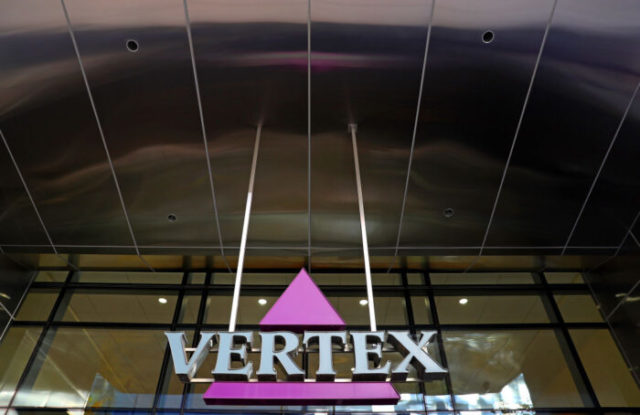
Vertex Pharmaceuticals started its collaboration with CRISPR Therapeutics on gene-editing therapies in a move intended to supplement the Boston company’s franchise of cystic fibrosis drugs. Now the company is amending the pact, grabbing a bigger share of the responsibility, as well as the financial upside, in a bet the bigger company is in the better position to more quickly bring to the market a CRISPR-editing therapy for two rare blood disorders.
The companies announced Tuesday that Vertex will pay CRISPR Therapeutics $900 million up front to change terms of the deal that had both companies split the costs and potential profits from sales of CTX001, a therapy currently in clinical development as a cure for sickle cell disease and transfusion-dependent beta thalassemia. Upon the therapy’s first regulatory approval, CRISPR Therapeutics would earn an additional $200 million payment. Under the revised agreement, Vertex will now shoulder 60% of the development costs and fhemoearn 60% of profits from the therapy’s sales.
“We see a significant commercial opportunity for CTX001, and we believe we will be able to further enhance that opportunity by fully leveraging the breadth of Vertex’s capabilities—including our established and proven R&D and commercialization expertise in serious diseases—to bring CTX001 to more patients around the world, more quickly,” Jeffery Leiden, Vertex’s executive chairman, said in a prepared statement.
The revision is the latest change in an alliance that began in 2015. At the outset, the partners planned to focus on using CRISPR technology to address the genes that lead to cystic fibrosis and sickle cell disease, among other genetic targets. In 2017, the companies amended the agreement to add CTX001 to the collaboration. Two more rare disorders were added to the alliance under a change made in 2019.
Beta thalassemia is a rare disorder that leads to low levels of hemoglobin, the oxygen-carrying protein in red blood cells. Sickle cell disease is a disorder in which abnormal hemoglobin cause red blood cells to form into crescent shapes. CTX001 is made by using the CRISPR technology to engineer a patient’s stem cells to produce high levels of fetal hemoglobin in red blood cells. Higher levels of fetal hemoglobin are hoped to reduce beta thalassemia patients’ dependence on blood transfusions. For sickle cell disease, the therapy is hoped to alleviate complications that sickle cell-shaped red blood cells cause throughout a patient’s body.
CTX is an ex vivo therapy, meaning that the gene-editing work on stem cells is done outside of the body. These edited stem cells are then infused into the patient. Vertex and CRISPR Therapeutics have framed the experimental therapy as a potential cure. A clinical trial that began in 2019 has dosed more than 30 patients, according to Samarth Kulkarni, CEO of CRISPR Therapeutics. Enrollment in both the sickle cell and beta thalassemia studies are expected to be completed this year.
Vertex and Switzerland-based CRISPR Therapeutics face competition in the race to commercialize genetic medicines for sickle cell disease and beta thalassemia. Sanofi, which is collaborating with Sangamo Therapeutics and its zinc finger nuclease gene-editing technology, is in Phase 1/2 development with potential therapies for both rare disorders. Sangamo has said it expects data will become available by the end of 2021.
Bluebird bio aims to treat sickle cell disease with its experimental gene therapy, Lentiglobin. The treatment uses a lentiviral vector to introduce a functioning copy of a gene to a patient’s stem cells. After that work is done ex vivo, the stem cells are transplanted back into the patient. Clinical trials testing Lentiglobin remain under an FDA clinical hold following reports in February that two patients developed cancers that may have been related to the experimental treatment. The Cambridge, Massachusetts-based biotech’s own analysis later concluded that the therapy was unlikely to be the cause of the suspected cancer cases, but the company awaits an FDA determination on whether the clinical trials can resume.
On Tuesday, bluebird said that the case of suspected myelodysplastic syndrome, a cancer of the bone marrow, is not cancer. An independent investigator has revised the diagnosis to transfusion-dependent anemia. The company has reported the finding to the FDA, and it is working with the investigator to determine the cause of the patient’s anemia.
However, the commercial prospects are dimming for bluebird’s Zynteglo, a gene therapy that European regulators granted conditional approval in 2019 for treating beta thalassemia. The company paused marketing of the gene therapy in February while the suspected cancers in the sickle cells studies were investigated. Though no cancers were reported in Zynteglo patients, that gene therapy uses the same viral vector technology that is the basis for Lentiglobin.
Bluebird bio said Tuesday that it has decided to withdraw Zynteglo from Germany after reimbursement negotiations failed to come up with a price that would “reflect the value of this one-time gene therapy with potential life-long benefit” for transfusion-dependent beta thalassemia patients. The company added that Zynteglo negotiations with other European countries are continuing. But withdrawal of Zynteglo in Germany will lead to the layoff of an unspecified number of bluebird employees.
Photo: David L. Ryan/The Boston Globe, via Getty Images







